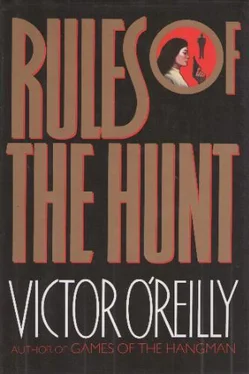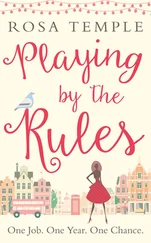Victor O'Reilly - Rules of The Hunt
Здесь есть возможность читать онлайн «Victor O'Reilly - Rules of The Hunt» весь текст электронной книги совершенно бесплатно (целиком полную версию без сокращений). В некоторых случаях можно слушать аудио, скачать через торрент в формате fb2 и присутствует краткое содержание. Жанр: Триллер, на английском языке. Описание произведения, (предисловие) а так же отзывы посетителей доступны на портале библиотеки ЛибКат.
- Название:Rules of The Hunt
- Автор:
- Жанр:
- Год:неизвестен
- ISBN:нет данных
- Рейтинг книги:4 / 5. Голосов: 1
-
Избранное:Добавить в избранное
- Отзывы:
-
Ваша оценка:
- 80
- 1
- 2
- 3
- 4
- 5
Rules of The Hunt: краткое содержание, описание и аннотация
Предлагаем к чтению аннотацию, описание, краткое содержание или предисловие (зависит от того, что написал сам автор книги «Rules of The Hunt»). Если вы не нашли необходимую информацию о книге — напишите в комментариях, мы постараемся отыскать её.
Rules of The Hunt — читать онлайн бесплатно полную книгу (весь текст) целиком
Ниже представлен текст книги, разбитый по страницам. Система сохранения места последней прочитанной страницы, позволяет с удобством читать онлайн бесплатно книгу «Rules of The Hunt», без необходимости каждый раз заново искать на чём Вы остановились. Поставьте закладку, и сможете в любой момент перейти на страницу, на которой закончили чтение.
Интервал:
Закладка:
The overt reason would be social. Fitzduane was in Japan and just wanted to pay his respects. Research had shown that companies in which Fitzduane had investments had done some business with the Namaka group – scarcely surprising given the pervasiveness of Japanese goods – so it could be considered that they had common business interests. Arguably of greater significance, he and Kei Namaka had a shared hobby: the Medieval Warrior's Society. To further arouse Kei Namaka's interest, he had brought him a gift, a handmade reproduction of a traditional Irish weapon.
Along with the approach to the Namakas, it was agreed that Fitzduane would work with Detective Superintendent Adachi's unit, with Chifune acting as his interpreter. To give him official status with the police, Fitzduane, who had held a reserve commission with the Rangers – unpaid – for some years, would use his rank, and carry a special identity card in English and Japanese to go with it. In Japan, where appropriate, he would be Colonel Hugo Fitzduane.
Fitzduane had arrived in Tokyo on a Friday, so it had been arranged that he would stay with Yoshokawa for the weekend.
Mrs. Yoshokawa had been dying to meet this Irishman who had saved her son from a terrorist kidnapping, and Yoshokawa himself was anxious to pay Fitzduane for his hospitality in Ireland. Also, the two men had come to like each other. Long discussions in Ireland had dented Yoshokawa's formal facade. In the privacy of his home, he relaxed completely and revealed a warm nature. Fitzduane, who had approached the visit with some concern that he might drown in protocol, was enjoying himself immensely. The only drawback was that the delightful Chifune had disappeared. Two plainclothes detectives outside the house provided security.
Given Yoshokawa's wealth, Fitzduane had expected a large house. Instead it was a relatively new modern dwelling of about two and a half thousand square feet; comfortable but not ostentatious. Two of the rooms were tatami rooms, decorated in Japanese style. The rest were Western. The family dinner, held in Fitzduane's honor, was served at a full-height table and featured smoked salmon, coq au vin, and an excellent sorbet, all accompanied with French wine. Japanese elements were the serving of rice as an option with the main course and plentiful supplies of sake. Fitzduane stuck to the wine. Sake had a habit, he had discovered, of creeping up on him.
Mrs. Yoshokawa was an attractive woman in her early fifties, with beautiful eyes and a face full of character. During dinner, she wore a white silk blouse and a long black velvet skirt. After the meal, both she and Yoshokawa excused themselves for a few minutes and then reappeared in traditional kimonos to demonstrate the tea ceremony.
Fitzduane had not been overly enthusiastic about watching someone spend half an hour to make tea, but he had never seen the full formal tea ceremony. When it was over, he was both impressed and deeply touched.
He slept well that night on a futon in the same tatami room where the tea ceremony had taken place. The ceremony was an exercise in doing one thing just about as well as it could be done. It had scant practical purpose, but every movement was carried out with an elegance and precision that made it compelling to watch. It was a tribute to the pursuit of excellence. And it was a welcome by the Yoshokawa family of Fitzduane to Japan. He felt very much at peace.
Yoshokawa's home was in Kamakura, an hour by train south of Tokyo. In Tokyo itself, agents of the Namaka security chief scoured the city, trying to find where Fitzduane might be staying. At about the time that Fitzduane was being ushered into the tatami room to watch the ceremony, Kitano received his answer. The Irishman was due to check in to the Fairmont Hotel on Sunday afternoon.
Sunday, thought Kitano, is a good day for a killing. Police manpower is lighter. Traffic is less. The streets are less crowded. Escape is easier. On the day Fitzduane checked in, he would be permanently checked out. The security chief smiled at his little joke and made some calls and called in some favors. Unfortunately, the active members of Yaibo were all out of the country. However, a minor yakuza gang, the Insuji-gumi, were deeply in his debt. An oyaban – boss – and five kobuns would attend to the matter. They would use swords. There would be no question of their victim's being wounded. He would be chopped to pieces.
Kamakura and Tokyo, Japan
June 7
Fitzduane spent Saturday sight-seeing in Kamakura with Yoshokawa – trailed at all times by two armed policemen.
He found the attention restricting, but was modestly cheered that the Tokyo Metropolitan Police Department wanted their bait – as Chifune had so charmingly put it – alive.
Kamakura was a seaside town – a city in Irish terms, since it boasted a population approaching two hundred thousand – bordered on three sides by mountains and on the fourth by the sea. Land access was only through a series of passes. Its defensibility had made it the capital of Japan some seven centuries earlier. The bakufu – military government headed by the shogun – had been based there before moving to Edo, now Tokyo, at the beginning of the seventeenth century.
Fitzduane found Kamakura a delightful place. It was heavily wooded, and boasted no fewer than sixty-five Buddhist temples and nineteen Shinto shrines. Strolling through the pine trees, looking at artifacts and architecture that had been there for centuries, he felt he was getting some small flavor of old Japan. The sense of the pursuit of excellence and the integration of the physical with the spiritual was everywhere evident in the temples and shrines. He greatly enjoyed the Buddhas. He could not see one without being reminded of Boots as a chubby baby.
Talk of the history of Kamakura as a seat of government prompted Fitzduane to ask Yoshokawa a question that had been on his mind for some time.
"Yoshokawa- san," he said, "I have not asked this directly before because I have been searching for the right moment, but do you have a direct interest in this Namaka matter? I know you feel compelled to help me because I was fortunate enough to be able to assist your son, but I sense there is something else. You seem more than just a helpful friend."
They were looking at the Great Buddha, a vast hollow bronze construction that towered over the temple and dwarfed human visitors. Erected the best part of a millennium earlier, it suggested considerable engineering talent. The current Japanese success in world markets had been many centuries in preparation, Fitzduane reflected.
Yoshokawa was silent for such a long time that Fitzduane was momentarily concerned that his question had caused offense. He knew that directness was not generally appreciated in Japan. However, he had gauged his moment carefully and the issues were serious. Time was running out. He needed answers quickly. He thought of the terrible moment when the back of Boots's head had appeared to open up in a crimson gash, and he thought of Christian de Guevain slaughtered like an animal. He felt a deep sadness and a cold anger. He had an obligation to destroy these people who threatened his life and the lives of those he cared about. It was a responsibility, a giri, as the Japanese might say, to do what had to be done.
It was then the Yoshokawa told him about the Gamma Society, about the group who were dedicated to reforming Japanese society ad driving out corruption, and some of the elements in the puzzle began to slip into place.
"Is Enoke- san, our friend the Deputy Superintendent-General, a member?" asked Fitzduane.
Yoshokawa nodded.
"And so who suggested I come to Japan?" said Fitzduane.
Yoshokawa looked embarrassed. Fitzduane smiled. "Yoshokawa- san ," he said, "from where I stand now, you did the right thing. OF course, if I am killed, I'll change my mind."
Читать дальшеИнтервал:
Закладка:
Похожие книги на «Rules of The Hunt»
Представляем Вашему вниманию похожие книги на «Rules of The Hunt» списком для выбора. Мы отобрали схожую по названию и смыслу литературу в надежде предоставить читателям больше вариантов отыскать новые, интересные, ещё непрочитанные произведения.
Обсуждение, отзывы о книге «Rules of The Hunt» и просто собственные мнения читателей. Оставьте ваши комментарии, напишите, что Вы думаете о произведении, его смысле или главных героях. Укажите что конкретно понравилось, а что нет, и почему Вы так считаете.




![Беар Гриллс - The Hunt [=The Devil's Sanctuary]](/books/428447/bear-grills-the-hunt-the-devil-s-sanctuary-thumb.webp)







